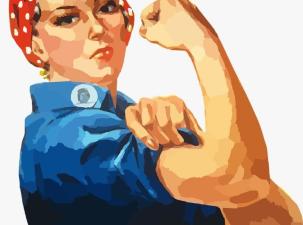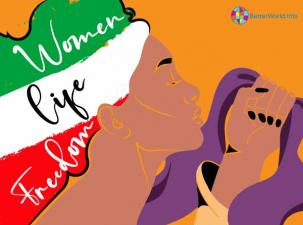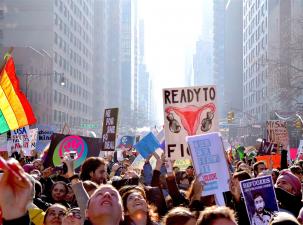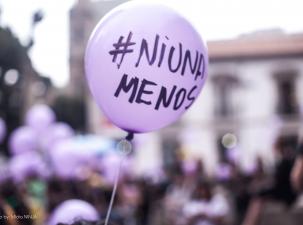Women's RIGHTS

➡️ WOMEN'S RIGHTS and the Ongoing Fight for Equality
Women have a long history in the struggle for gender equality. Over the centuries, women in all countries and cultures have faced enormous challenges, ranging from social discrimination and political oppression to economic disadvantage and violence. Despite attempts at suppression and much opposition, women have continuously stood up for their right to be equal and carve out their place in the world.
Jump straight to our guide on ➡️ Women's Rights
Explore our comprehensive resources on -
- Organisations and platforms for women's rights
- The Suffragettes, women's right to vote, and political participation
- Gender equality
- Violence against women
- Women and development
- Girls right to education
- Feminism
- Girl's and children's rights
- Better World Info's Twitter lists on women and women's rights
Although the situation for women has improved, there is still much room for improvement. Systematic discrimination, injustices, harmful societal norms, and the fear of violence restrict women around the world every day.
- Around 650 million women across the globe were married before the age of 18
- 71% of all human trafficking involves women and girls
- Over 2.7 billion women don't have the same work opportunities as men, with laws restricting what they can and cannot do
- More than 230 million girls and women alive today have undergone female genital mutilation - a violation of human rights which serves no health benefits, and creates a host of short and long-term medical complications
- Less than 15% of landholders worldwide are women
- Women make up just 25% of parliamentarians worldwide
German speakers should head to Bessere Welt Info to read more about Frauenrechte.
"There shall never be another season of silence until women have the same rights men have on this green earth" - Susan B. Anthony

The History of Women's Rights
The fight for women's rights gained momentum in the late 19th and early 20th centuries in the wake of the first feminist movements. Women such as Elizabeth Cady Stanton, Susan B. Anthony, and Emmeline Pankhurst fought for the right to vote, the right to education, and the end of gender discrimination. Their vision and tenacity laid the foundation for the achievements we often take for granted today.
Over time, significant progress has been made: women's suffrage has been introduced in many countries, and women have gained access to education and job opportunities that were previously unthinkable. The feminist movement has raised awareness of the systematic discrimination of women in areas such as wage inequality, domestic violence, and sexual harassment.
The Suffragettes and Women's Suffrage
The suffragettes were a socio-political movement in the late 19th and early 20th centuries that fought resolutely for women's political participation and campaigned against gender discrimination. They organised peaceful demonstrations and used civil disobedience and activism to bring greater attention to their demands.
Women's voting rights were eventually introduced over time in different countries, New Zealand being the first to do so. Women's suffrage also allowed women to hold political office and participate in democratic processes, leading to broader representation and greater empowerment of women in society. This was an important milestone on the road to gender equality and paved the way for further achievements in women's rights and participation.

Reproductive Rights and Abortion
Reproductive rights, including access to abortion, are fundamental components of health care and drivers of gender equality. Reproductive rights give women the ability to make autonomous decisions about their own bodies and the important decision of when to have a family, if at all. Opponents often cite religious and moral convictions to argue against the legality of abortion.
The ongoing debate in the U.S. and resulting rollback of women's rights with the overturning of Roe vs Wade in 2022 has set a dangerous precedent for other countries where the rise of pro-life movements has coincided with right-wing political or cultural shifts.
The Center for Reproductive Rights names 24 countries where abortion is completely prohibited, including Andorra, Malta, El Salvador, Honduras, the Dominican Republic, Senegal, Egypt, the Philippines and Laos. Ninety million women of reproductive age live in countries with no legal access to abortion.
Reproductive rights also include access to contraception, safe abortion services, fertility treatments, comprehensive sex education, and appropriate healthcare during pregnancy and childbirth. Countries with robust reproductive rights legislation report higher levels of gender equality and better health outcomes in general for women.
In parts of Africa, Latin America, and the Middle East, restrictive laws and practices can lead to severe penalties for women and medical professionals involved in performing abortions. In these countries, 22,800 women die every year from unsafe abortions. Globally, 8-11% of maternal deaths are due to unsafe abortions, 97% of which occur in low or middle-income countries.

Girls Right to Education
Worldwide, 119 million girls are out of school. In countries affected by conflict, girls are twice as likely to be out of school than those living in countries at peace.
Evidence tells us that educated women tend to be more informed about nutrition and healthcare, have fewer children, have healthier children, earn higher incomes, participate in the decisions that affect them, and build better futures for themselves and their families - thus perpetuating a cycle of opportunity instead of poverty.
Education is the strongest predictor of marriage age.
Girls face the same barriers as boys in terms of access to schools; however, additional barriers such as safety, hygiene, cultural norms, and sanitary needs prevent many girls from attending school. In poorer homes, boys will often be favoured as the better education investment.
Child marriage, gender-based violence, and poverty are huge hurdles in closing the gender education divide.
Educating girls is crucial for achieving societal progress and economic stability. When girls receive an education, they gain the skills and knowledge necessary to participate fully in economic, social, and political life.

Women and Politics
Women's political participation is fundamental to achieving a truly representative democracy. When women are actively involved in politics, they bring unique perspectives and solutions, addressing issues that a predominantly male leadership may otherwise overlook.
Equality in leadership results in more comprehensive and equitable policymaking that better serves the entire population instead of just 50%. Women are currently underrepresented at all levels of decision-making worldwide, and achieving gender parity in political life is far off.
At current rates, gender equality in the highest positions of power will not be reached for another 130 years. Just 19 countries have a woman Head of State, and women represent just 23% of Cabinet members around the world. The participation of female Cabinet ministers is also not evenly spread. The five most commonly held positions are in the fields of gender equality, family and children affairs, social inclusion, social protection, and Indigenous and minority affairs.
There are only 15 countries where women hold 50% or more of the positions of Cabinet Ministers in leading policy areas.
Gender quotas in politics have substantially contributed to progress over the years. Women's representation is 5% higher in countries with legislated candidate quotas. There is a great need for more countries to adopt such quotas and for the high-level involvement of women in politics to be normalised, especially when there is growing evidence confirming that women's leadership in political decision-making processes improves them.

Sexual Harassment and Violence Against Women
Despite the existence of more than 1,500 legislative measures across 193 countries to address violence against women, it is still a major public health problem and a serious violation of women's rights.
Globally, 1 in 3 women have been subjected to physical and/or sexual violence. More than 370 million girls and women alive today have experienced rape or sexual assault before the age of 18. When 'non-contact' forms of sexual violence, such as online or verbal abuse are included, the number rises to 650 million. In fragile countries such as those with weak institutions, conflict, or large numbers of refugees, girls face an even greater risk.
The adoption of the Beijing Platform for Action in 1995 was a huge stepping stone in preventing violence against women. More than 95% of institutional mechanisms for domestic and intimate partner violence were established after its creation.
Despite progress, preventing and prosecuting such acts remains a challenge. The stigmatisation of victims, lack of evidence, and a culture of silence make it difficult for women to seek justice. The creation of women's shelters, education and awareness, and the strengthening of women's rights and voices are fundamental steps to creating a culture of respect, equality, and zero tolerance for sexual violence and harassment.

Discrimination Against Women
Discrimination is found in every corner of society, and women, unfortunately, are no exception. Women experience unequal treatment in education, employment, pay, political participation, economic opportunities, healthcare, and access to resources including food.
In the world of work, women are often disadvantaged by discriminatory wage and pension laws. They encounter glass ceilings and face barriers to leadership positions. In addition, women are at increased risk of sexual harassment and discrimination in the workplace.
Eliminating gender discrimination goes hand in hand with promoting gender equality, breaking down gender stereotypes, and creating equal opportunities in all areas of life. By advocating for women's rights and equality in laws, legislation, and our communities, we can begin to create a fairer and more inclusive society.
Women's rights are not just a women's issue but a concern of society as a whole. By promoting women's rights, we are helping to create a better and more equitable world for everyone.
"If you want to lift up humanity, empower women. It is the most comprehensive, pervasive, high-leverage investment you can make in human beings." - Melinda Gates
Author: Rachael Mellor 05.01.25, licensed under CC BY-NC-SA 4.0
For more information on Women's Rights see below ⬇️
Info on Women's RIGHTS
- General Info[46]
- Organizations[89]
- Suffragettes & Women's Right to VOTE[112]
- Violence against Women[1372]
- Child Sex Tourism & Prostitution[60]
- Sexual & Reproductive Rights[54]
- Female Genital Mutilation[160]
- Forced / Early Marriage / Child Marriage[204]
- Trafficking in Women & Forced Prostitution[106]
- Mobbing & Bullying[109]
- Sexual Harassment[81]
- Sexual Abuse & Rape[234]
- Women's Issues in Development & Aid[5]
- Dowries[66]
- Women's and Girls' Right to Education[181]
- Convention on the Elimination of All Forms of Discrimination Against Women - CEDAW[19]
- Selected Articles[85]





